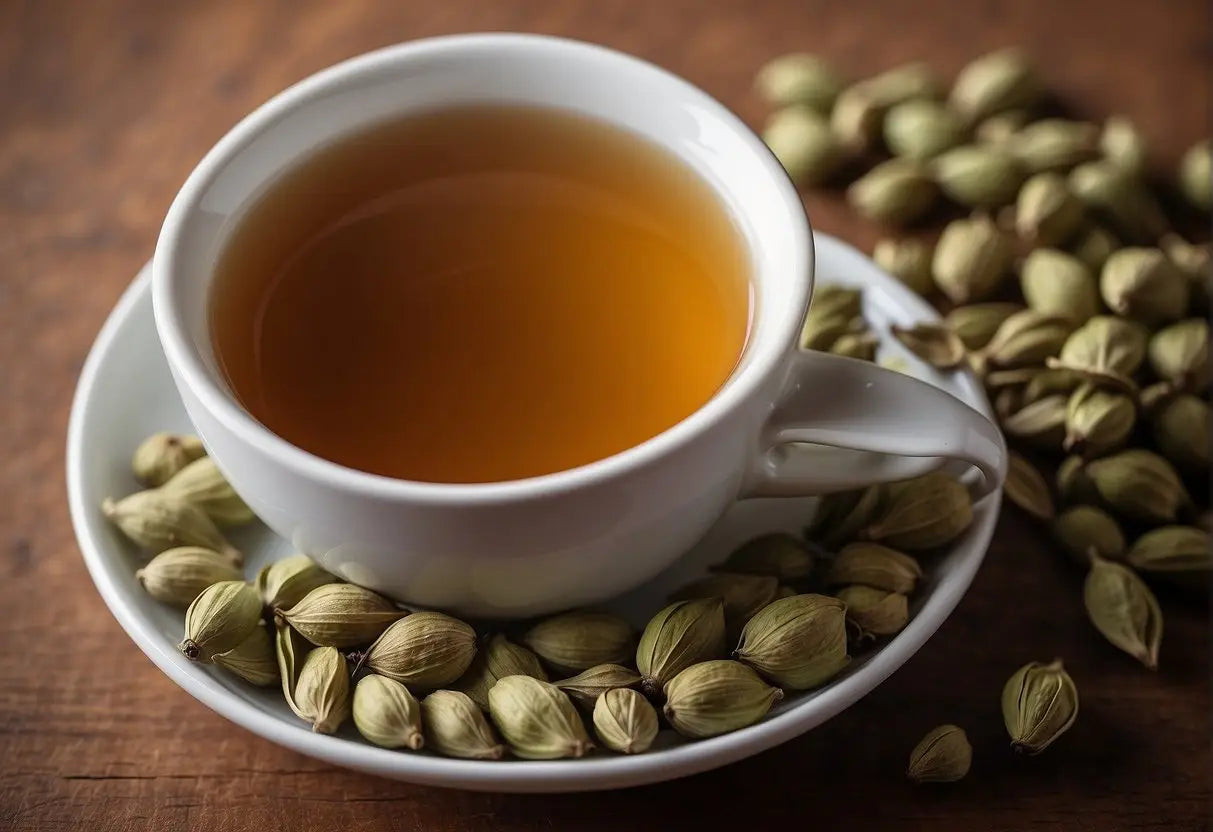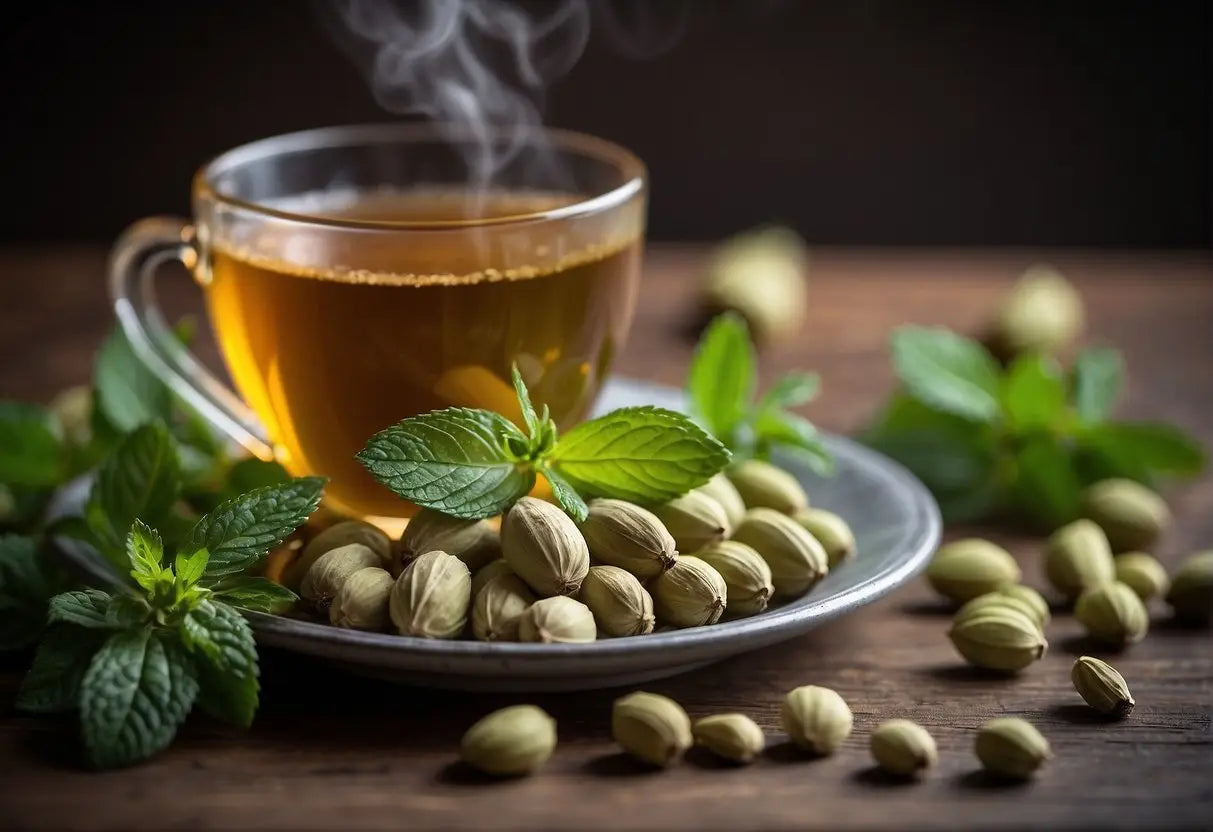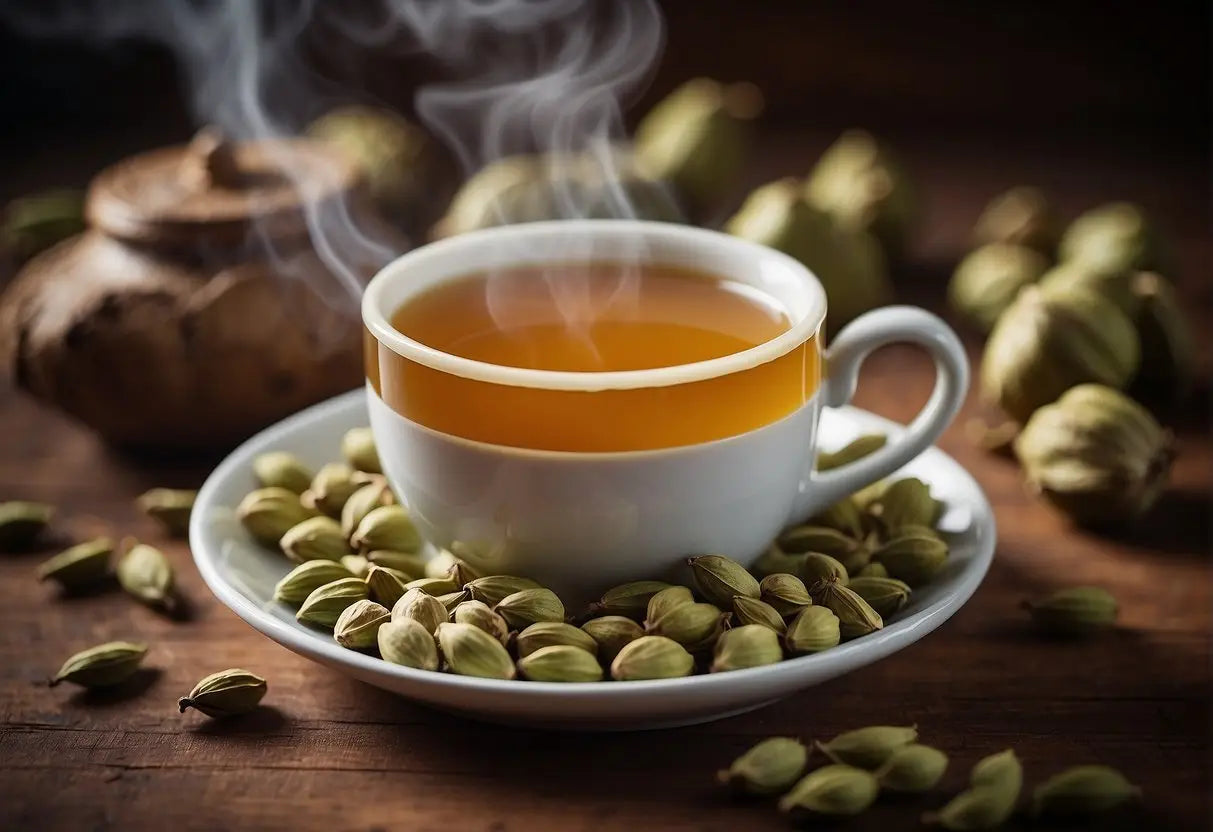Cardamom Tea Benefits
Cardamom tea is a flavorful infusion known for its aromatic fragrance and potential health benefits. It is a staple in various cultures and possesses a rich history.
What Is Cardamom Tea?
Cardamom tea is made from the seeds of the cardamom plant, Elettaria cardamomum. You can prepare this tea by steeping crushed cardamom pods in hot water. The result is a warm, slightly spicy, and sweet beverage that is often consumed for its soothing effects and possible digestive benefits.
History and Origin
Cardamom has roots that trace back to ancient times, with its origin believed to be the Western Ghats of Southern India. The Greeks and Romans used it for its pungent aroma, while in Scandinavia, it became popular due to trade routes. Today, cardamom remains highly valued in Middle Eastern and South Asian cuisine and has made its way into teas worldwide for both its flavor and potential health properties.
Bestsellers
Primary Benefits of Cardamom Tea
Cardamom tea provides you with a range of health benefits, particularly known for aiding in digestion, improving respiratory health, and assisting in body detoxification.
Digestive Health
Your digestive system may benefit greatly from cardamom tea. The compounds in cardamom have been shown to increase the movement of food through the intestines, which helps decrease bloating and indigestion.
- Antispasmodic effects: It can help to prevent stomach cramps.
- Production of bile: Aids in the digestion of fats and certain nutrients.
Respiratory Health
Cardamom tea can be a powerful ally for your respiratory system. It contains natural expectorant properties, which means it helps in clearing airways and relieving congestion.
- Cineole: A key ingredient known to alleviate symptoms of cold and cough.
Detoxification
Consuming cardamom tea may facilitate your body's detoxification processes. It has diuretic properties that promote the elimination of waste through increased urine production.
- Diuretic action: Helps in flushing toxins out of the body, supporting kidney function.
Nutritional Components

Cardamom tea offers you a rich blend of essential nutrients that contribute to overall health.
Essential Vitamins and Minerals
Your cup of cardamom tea contains a spectrum of essential vitamins and minerals. Notably, cardamom pods are a source of:
- Vitamin C: Important for immune function and skin health.
- Magnesium: Aids in nerve function and energy production.
These nutrients support your body's daily physiological processes.
Antioxidants Presence
The antioxidants found in cardamom tea play a crucial role in protecting your cells from damage. These include:
- Cineole: Contributes to the spice's anti-inflammatory properties.
Cardamom's antioxidants may also help in reducing the risk of chronic diseases.
Cardamom Tea and Weight Loss

Cardamom tea may contribute to weight loss goals by enhancing metabolism and controlling appetite.
Lao Ban Zhang
Metabolism Boosting
Drinking cardamom tea can increase your metabolism, which in turn may help your body burn fat more efficiently. Compounds in cardamom, such as cineole and limonene, have been found to have a thermogenic effect - meaning they can generate heat in the body and potentially lead to increased caloric burn.
Appetite Control
Cardamom tea may help in controlling your appetite. Its strong, spicy flavor is thought to help prevent overeating by providing sensory satiety—you feel satisfied from the flavors without the need for large portions. Additionally, cardamom is said to have digestive properties, reducing feelings of bloating and discomfort, which can sometimes be mistaken for hunger.
Other Health Benefits

Cardamom tea is not just a warming beverage but also a source of multiple health benefits. Your body may enjoy a variety of advantages from a regular intake.
Oral Health
Cardamom has antimicrobial properties that support oral hygiene. You might find it helpful in combating bad breath and preventing cavities.
- Freshens breath: Chewing on cardamom pods can kill bacteria that cause bad breath.
- Prevents cavities: The antibacterial effects may reduce the risk of dental cavities by targeting oral pathogens.
Circulatory Support
Cardamom tea might play a role in maintaining a healthy circulatory system. It's believed to help with blood pressure regulation and promote efficient heart function.
- Blood pressure management: Potassium in cardamom may help control heart rate and blood pressure.
- Antioxidant effects: The antioxidants found in cardamom could support heart health by reducing stress on the circulatory system.
Anti-Inflammatory Properties
Lastly, the tea's anti-inflammatory aspects are a highlight. You can count on these properties to assist in alleviating inflammation in your body.
- Inflammation reduction: Components in cardamom can reduce inflammation, which is at the root of many chronic diseases.
- Pain relief: The anti-inflammatory effects may help in reducing pain due to conditions like arthritis.
Preparation and Usage
Cardamom tea is both a delightful beverage and a traditional herbal remedy. Mastering its preparation is key to maximizing its potential benefits.
Brewing Techniques
To brew cardamom tea:
- Start with Fresh Ingredients: Use freshly crushed cardamom pods to ensure the full flavor and benefits.
- Ratios: For every cup of water, use 1 teaspoon of crushed cardamom.
- Water Temperature: Heat the water until just before boiling, around 200°F.
- Steeping Time: Allow the cardamom to steep in hot water for 5 to 10 minutes, depending on the desired strength.
Recommended Dosages
Daily Consumption:
- Standard: 2-3 cups per day is a common dosage to enjoy the benefits without overconsumption.
- Medicinal Use: Consult a healthcare provider for appropriate dosages if using for specific health concerns.
Potential Side Effects and Cautions

When you consume cardamom tea, it's essential to be aware of possible side effects and when you should exercise caution. Below is a summary of potential concerns:
- Allergic Reactions: You may experience symptoms such as rashes, shortness of breath, or hives if you're allergic to cardamom.
- Gallstones: If you have gallstone issues, be cautious. Cardamom can trigger gallstone colic, which is a type of pain due to gallbladder contraction.
Pregnant and Breastfeeding Women:
- It's generally safe in food amounts, but the effects of larger medicinal quantities are unclear.
- Consult your healthcare provider before consuming cardamom tea frequently.
Drug Interactions:
- Cardamom might interfere with anticoagulants (blood thinners), increasing the risk of bleeding.
- It may also interact with some anti-inflammatory drugs, altering their effectiveness.
| Condition | Precaution Required |
|---|---|
| Gastrointestinal Issues | Avoid if it exacerbates symptoms. |
| Surgery | Stop consuming it at least 2 weeks before a scheduled surgery due to potential blood-thinning effects. |
When consuming cardamom tea, start with small amounts to assess your tolerance and consult your healthcare provider if you have any pre-existing health conditions or are taking medication.
Research and Studies
In your exploration of cardamom tea benefits, documented clinical evidence and ongoing research offer tangible insights.
Clinical Evidence
Clinical studies have indicated that cardamom tea may have several health benefits. Blood pressure: A study published in the Indian Journal of Biochemistry & Biophysics found that participants consuming cardamom daily experienced a significant reduction in blood pressure. Antioxidant properties: Research in the Journal of Agricultural and Food Chemistry outlined that cardamom’s antioxidants could reduce inflammation and protect cells from damage.
Ongoing Research
Ongoing research into cardamom tea is investigating potential new health benefits. Cardiovascular health: Clinical trials are currently assessing the effect of cardamom on heart health parameters. Cancer: Preliminary studies are exploring how cardamom components might impact cancer cell growth, with promising early results.
← Older post Newer post →











